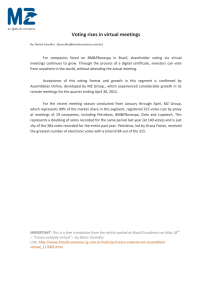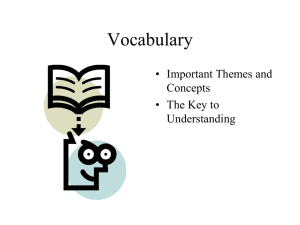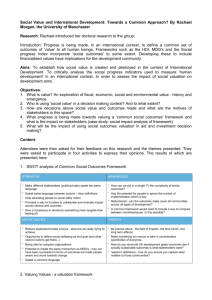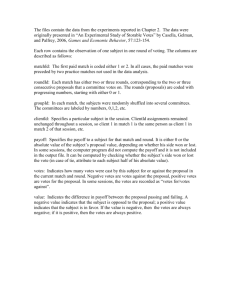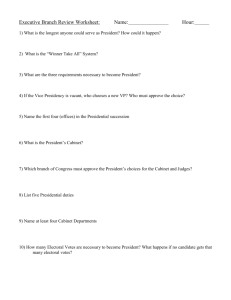Power Point Slides
advertisement
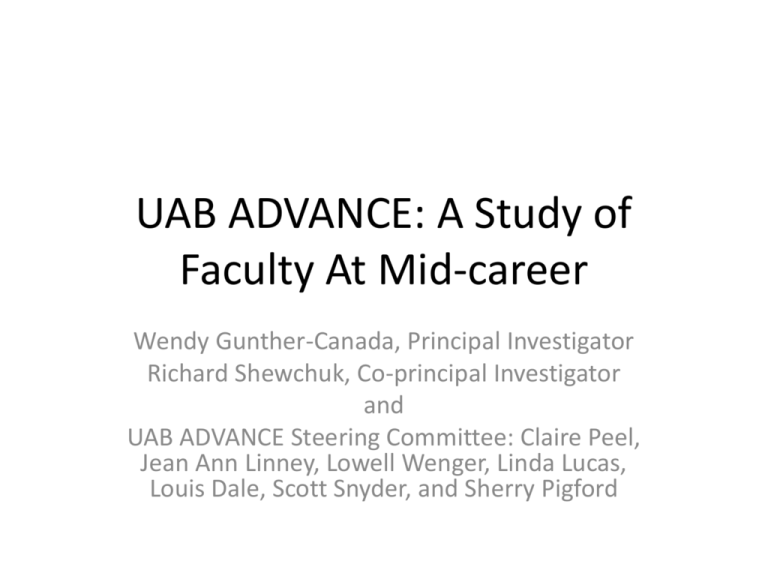
UAB ADVANCE: A Study of Faculty At Mid-career Wendy Gunther-Canada, Principal Investigator Richard Shewchuk, Co-principal Investigator and UAB ADVANCE Steering Committee: Claire Peel, Jean Ann Linney, Lowell Wenger, Linda Lucas, Louis Dale, Scott Snyder, and Sherry Pigford Introduction To date, there has been little research on women faculty at the rank of associate professor. Throughout the nation women faculty are clustered in the lowest academic ranks of instructor and assistant professor. For women who have earned tenure and promotion to the rank of associate professor there are new demands to fulfill in department and university life and additional research expectations for a successful candidacy for promotion to full professor. Today less than twenty percent of the full professors at doctoral institutions are women. Among UAB ADVANCE units (the Schools of Natural Sciences and Mathematics, Social and Behavioral Sciences and Engineering), this percentage is closer to 16%. Study Design •Tenured women in the Schools of Engineering, Natural Sciences and Mathematics, and Social and Behavioral Sciences were invited to participate as key informants. •Our research was guided by a series of questions aimed at assessing the impediments to steady progress to promotion to full professor for women. Questions (-) (+) What sorts of things interfere with career development of female faculty at the associate professor level? What sorts of things could be done to overcome the barriers that interfere with career development of female faculty at the associate professor level? Question Development Participants Associate Professors Full Professors Group1 n =8 - Question Group1 n =5 Group 2 n =7 + Question Group 2 n =5 Nominal Group Technique Methodology • • • • Structured, multi-step group process Lead by trained facilitator Elicits and prioritizes responses to a question NGT Steps: • Silent generation of ideas • Round-Robin recording of ideas • Serial clarification • Vote on item importance / Ranking NGT Voting Process • Weighted ballots/cards (3, 2, 1) • Each ballot assigned a different number of votes (3= 3 votes, 2= 2 votes, etc) • Participants voted on 3 most important responses • Final group product: ranked list of responses Rank Order Item Votes Total 1. 1,1,2 4 2. 2,2,2 6 3. 1,1,3 5 4. 2,2 4 5. … … RESULTS (-) Most important problems that interfere with career development for female faculty at the associate professor level (Associate Professor Perspective) (Generated responses: 48 Responses endorsed 14) # of Votes Votes Total Votes % of Total Votes 5 2 2, 3, 3, 3, 3 3, 3 14 6 29.17% 12.50% 3 2 1, 2, 2 2, 3 5 5 10.42% 10.42% Framing women's contribution of work as lower or diminished by those in power; More suspicious about actual quality of women and their work as they move up the ladder; Female faculty's work is scrutinized more closely, especially if working with males; Disappointment from the lack of appreciation that results from the application of different standards depending on gender (Combined Response) 2 Persistent emotional harassment from chair 2 1, 2 1, 2 3 3 6.25% 6.25% Women have small and less prestigious professional networks 1 3 3 6.25% Women are less willing to deal with and engage in conflict Productivity/Publication "Gap" Too much mentoring of undergraduate and graduate students; Women at this level have more frequent advising and directed readings roles which 'eat up time' (Combined Response) Having too many leadership responsibilities 1 1 2 2 2 2 4.17% 4.17% 1 1 1 1 1 1 2.08% 2.08% Fatigue & burnout result in women not wanting to work at a pre-tenure pace (Combined Response) 1 1 1 2.08% Biases that limit chair and leadership position opportunities for women Motivation undermined by differential compensation and smaller bonuses for women, an effect that increases over time Total 1 1 1 2.08% 1 15 1 1 48 2.08% 100.00% Responses Increasing family responsibilities; Work-family balance; Caring for aging parents; Physical constraints on sabbatical options; Desire to raise kids well; Being a single parent; Changes in life status and conditions that occur at this stage in life (Combined Response) Forced change in research interests Too many formal/institutional service responsibilities; Excessive committee assignments (Combined Response) Need for re-tooling of outdated technical skills (-) Most important problems that interfere with career development for female faculty at the associate professor level (Professor Perspective) (Generated responses: 21 Responses endorsed: 11) # of Votes 2 Votes Assigned 3,3 6 Percentage of Total Votes 20.00% Experiencing the pervasive belief that the innate abilities of women are viewed as not being equal to those of their male counterparts 2 2,3 5 16.67% Having a sense of isolation and loneliness due to limited professional and social networking opportunities 3 1,2,2 5 16.67% Having women value the incentives (rights and privileges) that accompany promotions as less important 1 3 3 10.00% Not having follow-up support after initial hiring facilitated by Advance-type initiatives Women often hold lower expectations for themselves 1 1 3 2 3 2 10.00% 6.67% Being viewed by students in a more informal, less respectful manner in contrast to how males are viewed 1 2 2 6.67% Focusing on needs of students rather than publication production 1 1 1 3.33% Having excessive committee assignment -- given that every committee seems to need female representation Not having appropriate mentors 1 1 1 1 1 1 3.33% 3.33% 1 15 1 1 30 3.33% 100.00% Responses Having family care responsibilities Finding it difficult to travel for extended periods of time (for sabbaticals) Totals Sum of Votes (+) Most Important Facilitator Strategies –Things could be done to overcome the barriers that interfere with career development for female faculty at the associate professor level (Associate Professor Perspective) (Generated responses: 28 Responses endorsed: 14) Responses # of Votes Votes Total Votes % of Total Votes Take comprehensive action based upon concerns raised during focus groups 3 3, 3, 3 9 21.43% Ensure department chairs treat all faculty fairly and above board in all respects Remove any administrator with a reputation/record of complaints for oppressing/harassing female faculty outside of legal action 3 3 1, 2, 3 1, 1, 2 6 4 14.29% 9.52% Ensure all faculty have leave/sabbatical opportunities to pursue research Implement a policy/framework that promotes the inclusion of women in interdisciplinary and interlevel groups 2 1 1, 3 3 4 3 9.52% 7.14% Encourage administration at all levels to take a stand on gender training issues Identify a ‘powerful female’ mentor for monthly meetings to address a broad spectrum of needs including assisting in setting priorities 1 1 3 2 3 2 7.14% 4.76% Examine the Advance program carefully in light of its unintended consequences. 1 2 2 4.76% Ensure that deans provide oversight of how chairs how treat female faculty regarding promotion and distribution of responsibilities 1 2 2 4.76% Nominate women for awards Ensure that faculty have a voice in university policy that affects them, especially with respect to work load issues 1 1 2 2 2 2 4.76% 4.76% Increase internal funding for faculty mid-career research transitions at both the university & department levels 1 1 1 2.38% Incorporate service activities in the compensation/reward structure Provide the same compensation for similar type of work performed Total 1 1 21 1 1 1 1 42 2.38% 2.38% 100.00% (+) Most Important Facilitator Strategies --Things that could be done to overcome the barriers that interfere with career development for female faculty in general at the associate professor level (Professor Perspective) (Generated responses: 24 Responses endorsed 12) Responses Provide effective mentoring by senior female faculty, not necessarily a female, and/or by senior person in your academic discipline, not necessarily internal Do something to make the advancement of women important to the senior men in the department/university Create clear, explicit, and consistent guidelines for promotion at all levels to avoid loopholes Require bi-annual review of progress towards promotion by the department's promotion committee Votes Assigned # of Votes Sum of Votes Percentage of Total Votes 2 3,2 5 25.00% 2 3,2 5 25.00% 1 3 3 15.00% 2 1,2 3 15.00% Stress the importance of their promotion to the department Facilitate collaborations that would be productive for the individual 1 1 3 3 3 3 15.00% 15.00% Consider family commitment in the scheduling of meetings 1 2 2 10.00% Provide information about alternative career paths, e.g.-how to move into administration Provide more research support for all mid-level faculty 1 1 2 1 2 1 10.00% 5.00% Prohibit assistant professors from serving as department and/or program director Increase transparency of promotion process in an effort to create trust, allowing females to believe that achieving full professor status is possible Develop and increase awareness about creative opportunities for professional development and sabbatical opportunities for those who can't leave due to family commitments 1 1 1 5.00% 1 1 1 5.00% 1 1 1 5.00% 20 100.00% Totals 11 Conclusions • Emerging themes from NGT research: – Productivity issues surrounding work-family conflict – A need for transparent and equitable policies regarding promotion to full professor – A need for focused faculty development – Impaired networking opportunities Recommendations • To increase visibility and support for women associate professors who have demonstrated meritorious achievement in teaching, research, and service. – Address microclimate issues at departmental level. – Analyze Career trajectories of mid-career faculty. – Encourage effective mentoring programs for faculty at mid-career. – Initiate and implement family friendly policies to support women at mid-career. Future Plans • Future Nominal Group Technique sessions will be scheduled with associate and full professor men to elicit problems and strategies at mid-career. • The co-investigators have discussed looking at racial distinctions at mid-career. • The principal investigators have discussed collaboration with other ADVANCE institutions using NGT sessions. – Additional sampling of professors at other institutions using the web-based platform for NGT assessment. – Integrating multi-institutional data to develop other assessment (e.g. cognitive mapping and ranking tasks)

